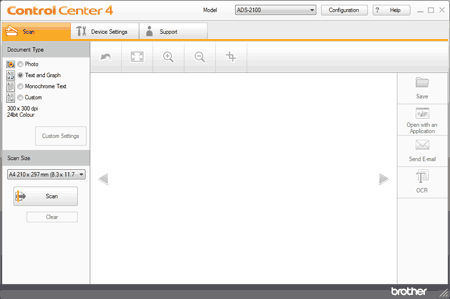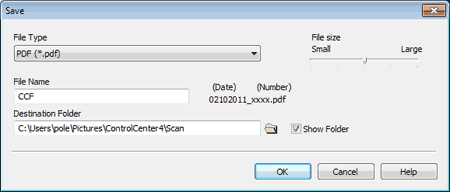| 1 | Load your document. | ||||||
| 2 | Click the The ControlCenter4 window will appear. | ||||||
| 3 | Select the Scan tab.  | ||||||
| 4 | Do one of the following:
| ||||||
| 5 | Change the scan size if needed (see Change the Scan Size). | ||||||
| 6 | Click the The machine starts scanning, and then the Scanning Completed dialog box will appear and display the number of scanned pages. The scanned image appears in the image viewer. | ||||||
| 7 | Click the left or right arrow buttons to preview each scanned document. | ||||||
| 8 | Crop the scanned image if needed (see Crop Scanned Image). | ||||||
| 9 | Do one of the following:
|
| • | If you select a 1 to 2 document size, the scanned image will be divided into two documents that are half the size of the setting. If you select 1 to 2 (A4), the scanned image will be divided into two A5-size documents. |
| • | To do 1 to 2 scanning, uncheck the Automatic Image Rotation check box in the Advanced Settings dialog box. |
| • | If you select a 2 in 1 document size, two scanned images will be combined into one document. |
| • | Each Long Paper option can scan a large document up to the following: Long Paper (Normal Width): 215.9 × 863.0 mm Long Paper (Narrow Width): 107.9 × 863.0 mm |
| • | If you cannot select Long Paper, uncheck the Duplex(two-sided) Scanning and Auto Deskew check box. |
| 1 | Click the The Save dialog box will appear.  | ||||||||||
| 2 | Select a file type from the File Type drop-down list.
| ||||||||||
| 3 | In the File Name field, enter a prefix for the file name if needed. | ||||||||||
| 4 | In the Destination Folder field, click the folder icon and browse to the folder you would like to save your scanned document to. | ||||||||||
| 5 | Click the OK button. The scanned document is saved in the destination folder. |